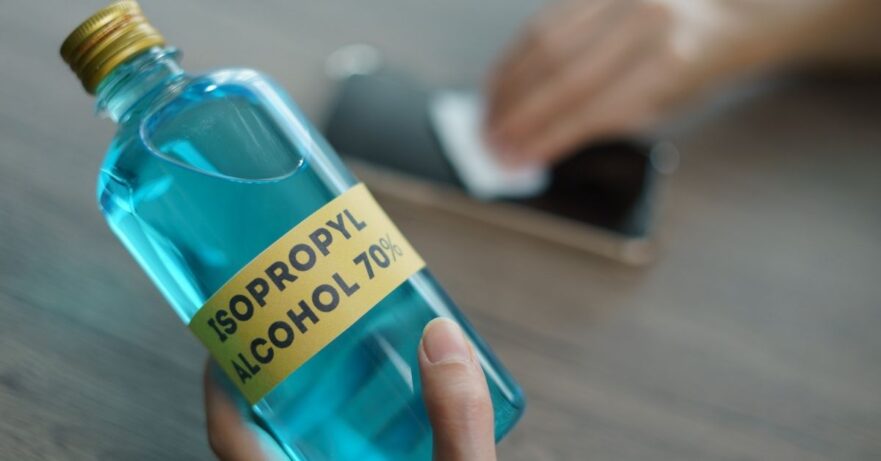Isopropyl alcohol (IPA) is a liquid chemical compound that is colorless and flammable with a strong sharp odor.
Just like methyl ethyl ketone (MEK), they are both solvents with similar chemical compounds to hydroxyl groups and are considered secondary alcohols. They create the same reaction when applied, but with different products and different rates.
What is it used for?
Isopropyl alcohol is used commonly (45,000 metric tonnes were consumed in the United States in 1990), largely as a solvent for coatings or industrial operations. 5400 metric tonnes were used for household and personal care items in that year. Because of its low toxicity, isopropyl alcohol is particularly popular in pharmaceutical applications.
As a chemical intermediary, some isopropyl alcohol is utilized. It dissolves a variety of non-polar substances in comparison to ethanol, it also evaporates quickly, leaves almost no oil traces, and is comparatively non-toxic when compared to other solvents. As a result, it’s commonly utilized as a solvent and a cleaning solution especially for dissolving oils. It is one among the alcohol solvents, along with ethanol, n-butanol, and methanol.
Cleaning eyeglasses, electrical connections, audio or videotape heads, DVD and other optical disc lenses, and removing thermal paste from heatsinks on CPUs and other IC packages are all frequent uses for isopropyl alcohol. Just like the common population, we see a lot of IPA use through a majority of pharmaceutical companies and practices.
There are the odd occasions where we will see its application used with the 3D printing process where molds and products need to be broken down. A big portion is also for cleaning the manufacturing facilities environment, as it can be used at a larger scale.
The current isopropyl alcohol market
Due to the COVID-19 pandemic, global consumption of isopropyl alcohol was expected to reach 2.1 million metric tonnes used in 2020, a 12% increase over 2019 levels – taking into account increased demand for sanitizing applications, which will more than compensate for losses from industrial applications as a result of the ensuing global economic crisis.
If an effective cure for COVID-19 becomes widely available, annual global demand is expected to grow as industrial demand for technical grades begins to recover and demand for cosmetic and pharmaceutical grades begins to decline from their highs of 2020.
China remains the world’s largest capacity holder, with over 30% of worldwide capacity, and is forecast to add 271,000 metric tonnes of capacity between 2020 and 25. In light of the COVID-19 pandemic, additional capacity is expected in India, Central, Eastern Europe, and Western Europe as governments recover indigenous strategic sources of IPA to supply the industrial and, in particular, the burgeoning sanitizing markets.
The United States is the world’s largest IPA user. During the 2020–25 period, Asia, particularly India, but also Africa and the Middle East, are predicted to expand faster than the world average, albeit from a smaller consumption base.
Maratek’s isopropyl alcohol services
When it comes to Maratek Environmental, there are two main branches when it comes to our involvement with solvents, that includes our services of hazardous recycling of the product and the waste of the product.
Our hazardous waste process is involved in both sides of the service for our customers, as handling large quantities of the product can be dangerous. Our advanced way of taking care of your solvent needs is what separates us from the rest. With Maratek environmental, you can either recycle or dispose of your solvent cost-effectively.
The recycled liquid solvent can be reused for another company or a recurring business. There are advantages to purchasing recycled solvent as you save up to 50-80% when buying while also being conscious of their socially economic responsibility compared to virgin solvent.
Interested in learning more about Maratek Environmental’s solvent disposal and recycling service, and how it can help your business save money? Get in touch with our team today.

